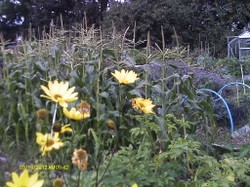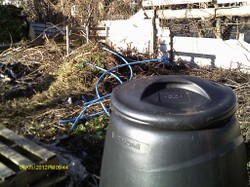Scientists are still eagerly working on biochar, and I had the benefit of reading a research report by one of them in The Horticulturalist, the journal of The Chartered Institute of Horticulture, of which I am an associate. The article was by Dr Glynn Perceval and Emma Schaffert,a researcher.
Biochar applied as a powder changes the structure of soils for the better. Structure denotes the pore space available in the soil, and the ideal structure is a crumb structure, which has small particles that retain cohesion with each other and have space enough for air and water. Sand has space, but the cohesion of its particles is weak, so it blows away; clay has cohesion that is too strong and leaves little pore space between particles. Biochar seems to make for a better, more crumb-like structure, and there are advantages to this.
The advantages are that the biochar-enhanced soil retains water more effectively, and this is very important in locations and times where there is water shortage. It also retains fertilizers, and thus prevents their leaching away.This can be useful to any grower. The over-enrichment of rivers by fertilizer leaching from farmland, is a serious problem in parts of the world, such as Britain, so the application of biochar to farmland would have a positive effect. The lovely crumb structure of biochar-enhanced soil allows for humic acid produced by the humus production process to be retained and available as a plant nutrient. This form of carbonized plant material also has the ability to retain mineral nutrients in soil for use by plants, which prevents wastage Biochar has an anti-fungal role, particularly in relation to the great fungal pest Phytophthora, one of whose species releases root rotting acids that create havoc on farms. Biochar soaks up the acids and neutralizes them.
Biochar also is found to adsorb heavy metals in soil, which are poisonous to humans, for it binds them to its surface and effectively neutralizes them.
Gardeners can use biochar as to improve soil structure, especially is they have clay or sandy soils. If your soil is sandy it will be a bit loose and prone to blow away or lose water, and the biochar will strengthen its cohesion. Clay has the opposite quality, for it is often too compact with little room for air and water, or for plant roots to pass through. Just applying biochar to the surface is insufficient, you need to dig it into the soil. If you are have a clay soil dig in some sand as well, and maybe some lime. but take a pH test first to see whether your clay needs liming. It is hard to over-lime the soil, but if the soil does not need liming you would be wasting your money. A sandy soil needs organic matter such as compost as well as biochar.
I have applied some biochar to my plot, but as I have sandy loam enriched with much organic material my soil was already in good condition. The biochar was one of the several organic enhancements that I have added to my soil.












 Pilgrimage. A reviewon 06/15/2025
Pilgrimage. A reviewon 06/15/2025
 Leo the Fourteenthon 05/09/2025
Leo the Fourteenthon 05/09/2025
 The Melsonby Hoardon 03/25/2025
The Melsonby Hoardon 03/25/2025



Comments
Routine implies a planned planned application at set periods of time.
Thank you for your comment below, in answer to my previous observation and question.
"A routine application" as the norm intrigues me.
Is a routine application all at once, such as Unitedstatesians implementing a day- to week-long spring cleaning yearly?
Or is that routine application implementing a rotating schedule of biochar, compost, leaf mold, manure, rock dust and seaweed applications one at a time at different times?
A routine application is the norm.
The computer crashed before I communicated another component of my comment below.
Biochar, compost, leaf mold, manure, rock dust and seaweed applications are emergency or routine applications.
Are the aforementioned enhancements all applied during routine applications or is there a rotating schedule of routine-applied enhancements?
Thank you for your comment below, in answer to my previous observation and question.
Some Unitedstatesians apply all applications when one aggravation appears even as others associate only the specific application with the specific aggravation.
Are biochar, compost, leaf mold, manure, rock dust and seaweed enhancements all applied during emergency applications or is only the specific enhancement matched to the specific emergency aggravation?
Generally these are not emergency applications, but routine ones.
Your next-last paragraph associates soil enhancement with biochar, compost, leaf mold, manure, rock dust and seaweed.
Do you employ them as problems arise or preventatively or both?
frankbeswick, Very nice article about life-friendly biochar (and compost, leaf mold, manure, rock dust, sea weed and wood ash). It always helps to know where and why something works, and I enjoy your explanation of terra preta since I lived in Brazil and since it is linked with the sites that are convincing candidates for "The Lost City of Z," for whose search many people, most famously Lieutenant Colonel Percy Fawcett and his son and his son's best friend in 1925, have been known or suspected of dying.
Yes, I was thinking of you readers from the dry South West of the USA when I wrote the article. In wet North West England [and gardening a mile from the River Mersey] it is nutrients that I want to retain in the soil.
I live in dry Denver so retaining water is a real plus! May have to try some this year. Thanks. Greatly informative article.